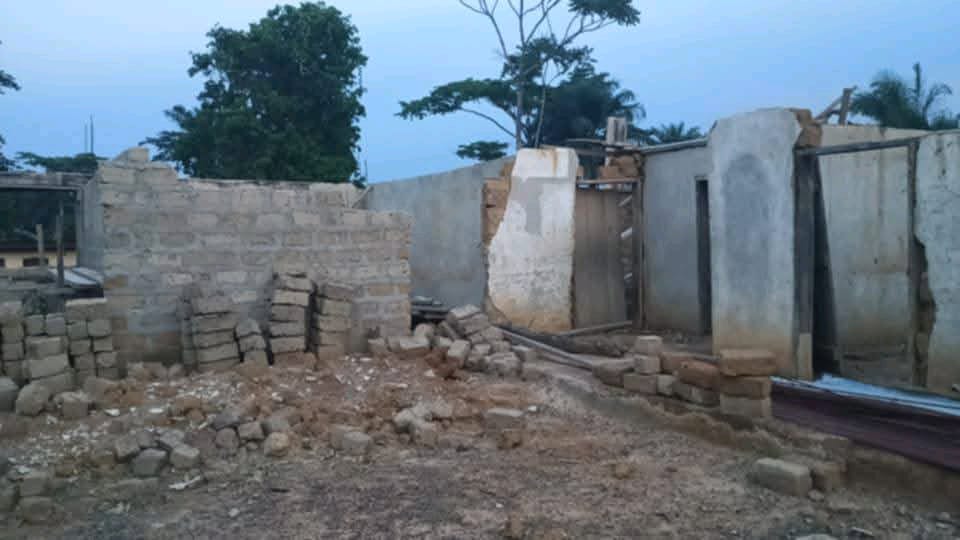The remote village of Kpoe Town, nestled in the hills of Zota District, Bong County, Liberia, is a stark illustration of the disparities that persist within the nation. Ravaged by a violent storm nearly three years ago, the town has been struggling to rebuild, its pleas for assistance largely ignored by government officials and aid organizations. The most pressing issues facing the community are the lack of a functioning school and inadequate access to clean water, two fundamental necessities that underscore the depth of their plight. While the residents have demonstrated remarkable resilience in the face of adversity, their efforts to rebuild have been hampered by a lack of resources, leaving them feeling abandoned and forgotten.
The storm of June 2021 destroyed the town’s only elementary school, forcing students to attend classes in the town hall, a makeshift arrangement devoid of proper desks, blackboards, or learning materials. This improvised learning environment, while a testament to the community’s commitment to education, is far from conducive to effective learning. The children, eager to learn despite the challenging circumstances, are losing hope as their pleas for help go unanswered. Community leaders, witnessing the dwindling morale of their young people, fear the long-term consequences of this educational crisis, recognizing that the future of the town rests on the shoulders of these children. The lack of a proper learning environment threatens to derail their potential and perpetuate a cycle of poverty.
Despite the lack of external support, the residents of Kpoe Town have not been idle. They have pooled their meager resources and, through small contract jobs and manual labor, managed to partially reconstruct the school building. However, their progress has stalled due to a lack of funding and materials. Their efforts, though commendable, are simply not enough to overcome the scale of the damage. They are now appealing for assistance to complete the reconstruction of the school, emphasizing the urgency of the situation and the devastating impact it is having on the children’s education. They see education as a lifeline, a pathway out of poverty, and their desperation to provide this opportunity for their children is palpable.
Adding to their woes, the town’s only hand pump, serving a population of over 800 people, is struggling to meet the demand for clean water. Long queues, disputes over access, and the increasing risk of waterborne diseases have become a daily reality. The community’s leadership has highlighted the urgent need for an additional water pump to alleviate the strain on the existing one and mitigate the health risks associated with inadequate water supply. The lack of clean water not only impacts their health and sanitation but also consumes valuable time and energy that could be directed towards other essential activities, further exacerbating their already precarious situation.
The frustration felt by the residents of Kpoe Town is compounded by the unfulfilled promises made by government officials and elected representatives. They recall visits from lawmakers and education officials who, after witnessing the devastation and the children’s plight, pledged assistance. However, these promises have yet to materialize, leaving the community feeling betrayed and abandoned. Repeated appeals to the Ministry of Education, the County Education Officer, and their District Representative have gone unanswered, deepening their sense of isolation and hopelessness. This perceived neglect underscores the challenges faced by marginalized communities in accessing essential services and holding their elected officials accountable.
The residents of Kpoe Town are not asking for handouts, but for the basic rights and opportunities afforded to all citizens. They believe their children deserve the same educational opportunities as those in urban centers like Monrovia and Gbarnga. They are pleading for equity, dignity, and the chance to build a better future for their community. Their cry is a call for recognition, for inclusion, and for a just share of the nation’s resources. As the rainy season approaches, they face not only the predictable challenges of inclement weather but also the continuing uncertainty of their future, desperately hoping that their pleas will finally be heard and acted upon. Their resilience and determination are evident, but they cannot overcome these challenges alone. They need the support of the government, NGOs, and anyone who can empathize with their plight and is willing to extend a helping hand.














